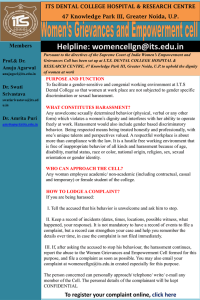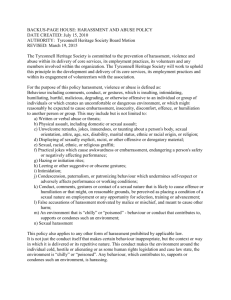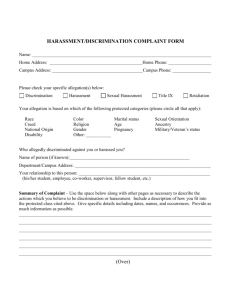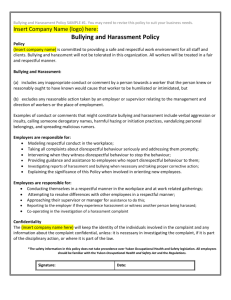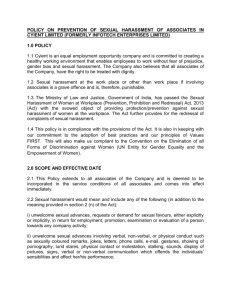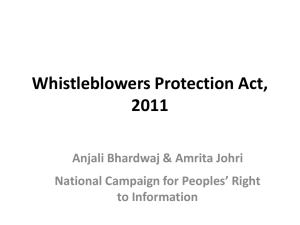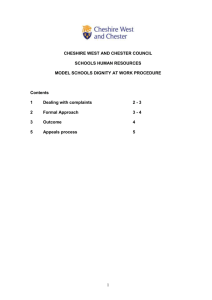4.8.6 Harassment
advertisement
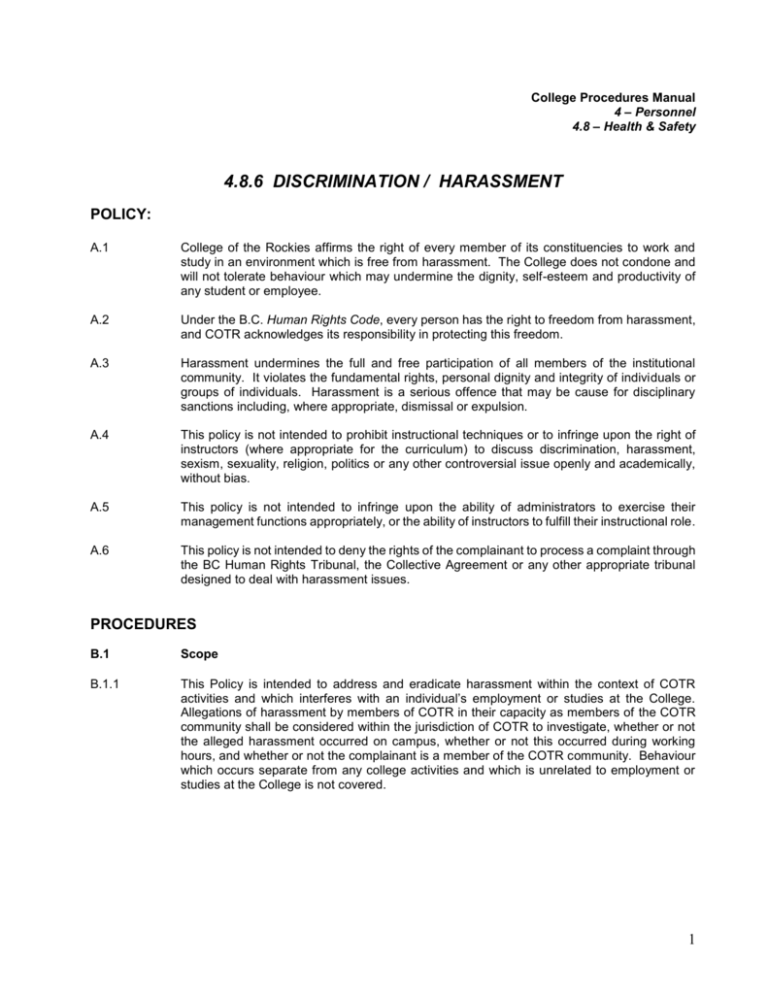
College Procedures Manual 4 – Personnel 4.8 – Health & Safety 4.8.6 DISCRIMINATION / HARASSMENT POLICY: A.1 College of the Rockies affirms the right of every member of its constituencies to work and study in an environment which is free from harassment. The College does not condone and will not tolerate behaviour which may undermine the dignity, self-esteem and productivity of any student or employee. A.2 Under the B.C. Human Rights Code, every person has the right to freedom from harassment, and COTR acknowledges its responsibility in protecting this freedom. A.3 Harassment undermines the full and free participation of all members of the institutional community. It violates the fundamental rights, personal dignity and integrity of individuals or groups of individuals. Harassment is a serious offence that may be cause for disciplinary sanctions including, where appropriate, dismissal or expulsion. A.4 This policy is not intended to prohibit instructional techniques or to infringe upon the right of instructors (where appropriate for the curriculum) to discuss discrimination, harassment, sexism, sexuality, religion, politics or any other controversial issue openly and academically, without bias. A.5 This policy is not intended to infringe upon the ability of administrators to exercise their management functions appropriately, or the ability of instructors to fulfill their instructional role. A.6 This policy is not intended to deny the rights of the complainant to process a complaint through the BC Human Rights Tribunal, the Collective Agreement or any other appropriate tribunal designed to deal with harassment issues. PROCEDURES B.1 Scope B.1.1 This Policy is intended to address and eradicate harassment within the context of COTR activities and which interferes with an individual’s employment or studies at the College. Allegations of harassment by members of COTR in their capacity as members of the COTR community shall be considered within the jurisdiction of COTR to investigate, whether or not the alleged harassment occurred on campus, whether or not this occurred during working hours, and whether or not the complainant is a member of the COTR community. Behaviour which occurs separate from any college activities and which is unrelated to employment or studies at the College is not covered. 1 B.2 Definitions B.2.1 Discrimination and Harassment B.2.1.2 Harassment is defined as behaviour or the effect of behaviour, whether direct or indirect, which meets one of the following conditions: Is abusive or demeaning; Would be viewed by a reasonable person experiencing the behaviour or effect of the behaviour, as an interference with her/his participation in an institutional related activity; Creates a poisoned environment. B.2.1.3 Discrimination is when an individual or group of individuals have been singled out and treated adversely or differently from others due to characteristics such as: race, colour, ancestry, place of origin, political belief, religion, marital status, family status, physical or mental disability, sex, sexual orientation, age, and in the case of employment, unrelated criminal convictions. B.2.1.4 Harassment can occur between peers, between students/employees, or in the supervisory relationship. Examples include: Verbal abuse or threats; Unwelcome remarks, jokes, innuendos or taunting; Displaying of offensive or derogatory picture or signs; Graffiti, posters, e-mail, web pages which promote hatred or violence. B.2.2 Sexual Harassment B.2.2.1 Sexual harassment is behaviour of a sexual nature by a person who knows, or ought reasonably to know, that the behaviour is unwanted or unwelcome; and which interferes with another person’s participation in an institution-related activity; or leads to or implies employment or academically related consequences for the person harassed; or which creates a poisoned environment. Examples include: repeated, unwelcome invitations or requests to socialize; derogatory and/or offensive comments about women or men; unnecessary and unwelcome physical contact such as hugging, patting, pinching; criminal harassment (“stalking”) and sexual assault, including acquaintance/date rape. NOTE: A relationship of mutual consent, a hug between friends, mutual flirtation or any other activity that is welcomed and consensual is not sexual harassment. B.2.3 Personal Harassment B.2.3.1 Personal harassment means repeated, intentional, offensive comments and/or behaviour intended to deliberately demean and cause personal humiliation to another employee/student. 2 Examples include: discriminatory behaviour in violation of human rights legislation physical threats, abuse, assault, intimidation verbal abuse displays of pornographic, and/or racist pictures, photographs, literature not related to an appropriate academic context of creating awareness of such material B.3 Interim Relief B.3.1 The College President or Responsible Administrator may take whatever interim measure s/he considers necessary to protect the College community or any of its members, pending the completion of an investigation of a harassment complaint. B.3.2 Such measures may include but are not limited to, ordering the complainant, respondent, witnesses or other parties to cease and desist from engaging in a particular type of behaviour, and/or restraining access to a specific campus or specific areas of a college campus pending investigation. B.3.3 For just cause, the President/CEO of College of the Rockies may suspend a student or employee from the institution and deal summarily with the matter of discipline. B.4 Procedural Fairness B.4.1 This policy will be interpreted, administered, and applied in conformity with the principles of procedural fairness and natural justice. B.4.1.1 In particular: a. b. c. d. e. f. g. h. A complainant has a right to seek action. A respondent has a right to know the allegations and to be given an opportunity to answer them. Both parties have the right to a fair and timely process of resolution. Both parties have a right to have a support person in attendance at all formal meetings. The rules, standards and procedures used to settle a complaint will be applied consistently Decisions for penalty or remedy are in proportion to the seriousness of the complaint, are made without bias and are made after full consideration of all pertinent evidence has taken place A complaint filed against an individual will not, in and of itself, constitute grounds for disciplinary action against that individual. In the absence of a complaint, the President reserves the right to initiate an independent harassment investigation if sufficient cause has been demonstrated to warrant such action. B.5 Retaliatory Action B.5.1 Frivolous, vexatious or malicious complaints of harassment or breaches of the confidentiality provision of this clause or retaliation in respect of a complaint may result in discipline. 3 B.6 Confidentiality and Anonymity B.6.1 Allegations of harassment may require the disclosure of sensitive information. In order to encourage persons who have been subject to harassment to come forward, and to protect the rights and reputations of the complainant and the respondent throughout the investigation process, the College will attempt to ensure that confidentiality is maintained except where disclosure is necessary for the purposes of investigating and resolving the complaint. B.6.2 Confidentiality must, however, be distinguished from anonymity. If a complainant wishes to proceed with informal resolution or formal investigation, the respondent must be made aware of the nature of the harassment, including the identity of the complainant. All parties and witnesses to a complaint will endeavour to maintain confidentiality throughout the informal resolution and/or formal investigation procedures. B.6.3 All information gathered pursuant to the provisions of this policy will be held by the College in confidence and will not be disclosed except as required by law, or as required to ensure there is a full and fair investigation of a complaint. B.7 Record B.7.1 For every complaint received an Incident Report record will be created by the College Contact Person. B.7.2 Incident Reports files will be maintained within the office of the Director of Human Resource Development. B.8 Complaint Procedures B.8.1 The following procedures are aimed at providing a method for the resolution of harassment complaints which may occur at the College of the Rockies. B.8.2 These procedures are designed to protect the individual with the highest possible level of confidentiality. This policy is not intended to: a. resolve incidents that fall into the category of sexual assault and are governed by the Criminal Code of Canada; or b. deny the rights of the complainant to process a complaint through the B.C. Human Rights Tribunal, the Collective Bargaining Agreement or any other appropriate tribunal designed to deal with harassment issues. B.8.2.1 Should a complainant file a complaint under the BC Human Rights Code, it is understood that the complaint will be set aside until such time as the procedures under this policy have been completed. B.8.2.2 Union/Association members may seek recourse through their respective grievance processes. This process can begin within 10 working days of the Harassment Procedures being abandoned or concluded. The employer acknowledges that the timelines for submission of such a grievance begins when the Harassment investigation process is concluded or abandoned. 4 B.8.3 Harassment Team B.8.3.1 The College through the Director of Human Resource Development, or designate will establish a Team as follows. B.8.3.2 Membership Membership on the Harassment Team will include: a. The Director of Human Resources plus one other member from the management group. b. Two representatives, on an even gender basis if possible, from each of the following: the Students’ Association, the CUPE Bargaining Unit, and the Faculty Bargaining Unit. The groups represented will recommend members to the Harassment Team. It is preferred that representatives have some knowledge or background related to Human Rights and/or Harassment. B.8.3.3 Team Leader B.8.3.3.1 The Leader for the team will be the Director of Human Resource Development, or designate. The team leader will confirm membership with the Students’ Association and the two Bargaining Units. B.8.3.3.2 Should the Director of Human Resource Development be named as a complainant or respondent, or declare a conflict of interest, the President will appoint a replacement Team Leader from the Harassment Team. B.8.3.3.3 Should a Board member(s) be named as a complainant or respondent, the complaint shall be brought to the attention of the Board Chair and/or the Board Vice-Chair as appropriate. B.8.3.4 Term of Membership B.8.3.4.1 With the exception of the Director of Human Resource Development, a College employee’s term will normally be two years, students will normally serve one year; however, there will be no limit to the number of terms an individual may serve. B.8.3.5 Terms of Reference To review policy and procedures governing harassment issues; To monitor the implementation and operation of the policy and procedures, evaluate processes in the administration of the policy and to make necessary revisions; To design a process for ensuring that all campus students and personnel are fully informed concerning the College’s policies and procedures relating to harassment; To generate a list of approved internal mediators. To generate a list of approved investigators (Note: According to the Faculty Collective Agreement, if the local parties are unable to agree upon a list of investigators, JADRC will determine the list). To recommend training and orientation for College Contact Officers; To be informed of the appointments to the positions of College Contact Person. Union/Association Executive members, the HRD Director, and the HRD Development Officer will not be considered for the position of Contact Officers; 5 B.8.3.6 Meetings The Team will normally meet once a year. Ad hoc meetings will occur as needed. B.9 College Contact Persons B.9.1 Appointment B.9.1.1 The President in consultation with the Director of Human Resource Development will appoint a minimum of one individual from each campus (Cranbrook/Kimberley, Creston, Elk Valley, Golden and Invermere) as the College Contact Person (CCP). B.9.1.2 The selected individuals must have strong interpersonal skills, and must be willing to undertake training to become conversant with all the relevant policy and procedures. B.9.1.3 The term of the appointment shall normally be for a period of one year and subject to annual renewal. The CCP may resign at any time by giving at least 30 days notice to the Director of Human Resources. As a vacancy occurs, the President/Campus Manager will confirm in writing to the Director of Human Resource Development the name of the replacement for the CCP. B.9.2 Role of College Contact Person The CCP will be responsible for implementing the process for ensuring that all campus students and employees are informed concerning the College’s policies and procedures relating to harassment; The CCP will not represent the complainant. Instead, the CCP will inform the complainant of the types of support systems, options and alternatives available to him/her and may assist the complainant in writing out the formal complaint; The CCP will ensure the complaint is forwarded to the appropriate persons, depending on which complaint process is being followed; The CCP will liaise with the College's Harassment Team, as appropriate; The CCP will participate in ongoing training on harassment, conflict resolution, and mediation techniques; The CCP may serve as an Internal Mediator but not if s/he has been involved in the Informal Complaint process for that complaint. The CCP will remain impartial and protect confidentiality. B.10 Complaint Process (see Appendix “A” Flowchart) B.10.1 Withdrawal B.10.1.1 The Complainant may withdraw the complaint during either the informal mediation or the formal investigation processes. B.10.2 Individual (Complainant) B.10.2.1 An individual who believes he/she has been subjected to harassing behaviour is encouraged to go directly to the harasser(s)/(respondent/s) and request that the behaviour cease. 6 B.10.2.2 a. b. c. The complainant may initiate an informal complaint if: the request is unsuccessful, and/or the complainant feels too uncomfortable making such a request, and/or the complainant feels a need for further guidance and information. B.10.3 Informal Complaint B.10.3.1 If the complainant is not able to resolve the issue as per B.9.1, the process shall move to the Informal Complaint step whereby the complainant will arrange a meeting with a CCP. B.10.3.2 The CCP will (discuss the following issues and avenues of resolution or redress): clarify what constitutes harassment; ensure complainant understands the need to create private, written records of the incident(s); review informal options with complainant including: approaching the respondent to ask that the harassment cease; discuss other internal methods of resolution and assistance available to the complainant; e.g., other COTR policies and procedures, under other collective agreement(s); ensure complainant is aware of other avenues of redress available to the complainant outside of the College; e.g., BC Human Rights Tribunal, RCMP. B.10.3.3 If the complaint is not resolved through the Informal process, then the complainant may proceed to the Informal (or Consensual) Mediation process or the Formal Investigative process. B.10.4 Informal (or Consensual) Mediation B.10.4.1 Consensual mediation will require the agreement of the complainant and the alleged harasser to use the following process. a. The complainant will prepare a verbal complaint with the CCP, providing details of the alleged harassment including date(s), time(s), place(s), name(s) or individual(s) involved in the incident(s), name(s) of witness(es), etc. b. The CCP will advise the respondent that the mediation will proceed. The parties will discuss the nature of the complaint, and agree upon who will conduct the mediation from the approved list. If a CCP has been involved in the Informal Complaint Process and is on the approved mediator list, s/he will not be involved as the Informal Mediator; another mediator must be used. c. The mediation process will then begin and conclude within 5 working days after the mediator has been selected. All participants will keep the mediation process and resolution strictly confidential. Where a solution is reached, the complainant and the respondent must agree in writing to the resolution and the matter will then be considered concluded. 7 Where there is a written agreed resolution at the mediation stage a copy of the resolution will be placed on the respondent’s file. The written resolution will be removed from the respondent’s file after 12 months, unless there has been a subsequent complaint of harassment against the respondent within the 12-month period. If the dispute is not resolved through the Informal Mediation process, then the complainant may proceed to Investigation. B.10.5 Formal Investigative Process B.10.5.1 Where either the complainant or respondent does not agree to mediation, or no resolution is reached during mediation, the complaint will be referred to an investigator selected from a list of investigators agreed upon by the local parties. B.10.5.2 If the dispute is referred to the Formal Investigative Process, the following shall occur: a. The College Contact Person will forward a copy of the complaint to the Harassment Team Leader and to the respondent, if not already done. The respondent will within 2 days provide the Harassment Team Leader and the Complainant with a response. b. The Harassment Team Leader will appoint an Investigator within 5 working days of the referral. The Investigator will be provided with a copy of the complaint and the response. c. The role of the Investigator will be to ascertain facts. The Investigator will meet with the complainant and the respondent (separately or together) and any other individual(s) who may have some input into the situation. The appointment of an Investigator does not preclude an Investigator from mediating the dispute where possible. d. The investigator’s report will not be introduced as evidence or have standing in any arbitration, or other legal procedure. This does not preclude the parties from reaching an Agreed Statement of Fact based on facts in the report in preparation for an arbitral proceeding. e. Despite B.9.4.2 (d), the College is entitled to rely on: i. ii. 8 the fact of mediation or the report of an investigator as evidence that may mitigate liability in any proceeding that follows mediation or receipt of the investigator’s report. the investigator’s report as evidence that it acted in good faith in any action it undertook following receipt of the report, where the issue of good faith is raised by the complainant, a griever or the Union/ Association. f. The investigator will not be compellable as a witness in any arbitration or other legal procedures which may result from the investigation. g. The investigator will conclude her/his work within 5 days of appointment and will render a report within a further 5 days. These timelines may be extended if deemed appropriate by the local parties. h. A copy of the investigator’s report will be given in confidence to the President. The President will forward a copy of the report, along with the written determination as prescribed in (k) under confidential cover, to the complainant and the alleged harasser. i. The investigator may, as part of her/his report, make recommendations for resolution of the complaint. j. The investigator’s report will not be placed on the respondent’s file. k. The President will within 10 days of the receipt of the investigator’s report, make a written determination upon the facts and recommendation(s), if any. The determination will: i. state the action(s), if any, to be taken or required by the Employer. ii. include, where appropriate, a statement confirming the action(s), if any, to be taken or, where appropriate, provide a statement of exoneration. iii. The above noted procedure does not restrict: - the Employer’s right to take disciplinary action; - the Union’s/Association’s right to grieve, or to grieve an alleged violation of the article, or a student’s right to appeal (see Appeal Process on Student Discipline – 2.4.7). l. At the completion of the investigative process, where disciplinary action was required to be taken against a College employee, all determinations pertaining to the employee will be placed within his/her personnel file. In a case where a student is found at fault requiring that disciplinary action be taken, all determinations pertaining to the student will be placed within his/her student file. m. The College may apply to have a complaint dismissed where the complainant has refused a reasonable offer of settlement. B.11 Timelines B.11.1 In the event that extenuating circumstances make it impossible to adhere to the timelines as outlined in this policy, the Harassment Team Leader will be responsible for establishing alternative dates that adhere as closely as possible to the policy and will maintain a record of all such adjustments as deemed necessary. (Incorporates previous original EKCC Policy No. 4.1.0.10 Sexual Harassment approved 3 June 1993 and Board Personnel Policy 4.5 Workplace Environment) Issue Date: COTR Policy COTR Board Policy Mar. 15, 1993 October 1993 Concerning: COTR Administration; “Workers” as defined by WCB Act Amendment: (4 ) July.8, 2008 Cross Reference: 1.1.5 Code of Ethics; 2.4.5 Student Conduct & Responsibilities; 2.4.6 Student Discipline; 2.4.7 Appeal Process on Student Discipline Manager Approval: Original signed by D. Kielly Title: Chair, CPC Date: 31 January 2006 College Approval: Original signed by N. Rubidge Title: President/CEO Date: 31 January 2006 dsm: July 9, 2008 9

